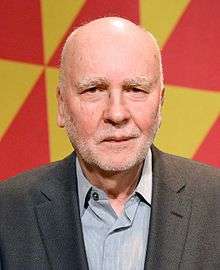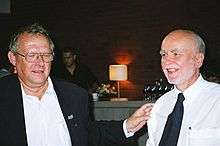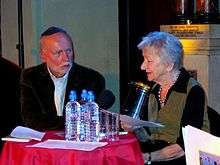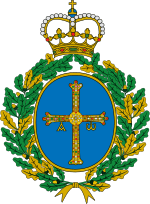Adam Zagajewski
Adam Zagajewski (born 21 June 1945 in Lwów) is a Polish poet, novelist, translator and essayist. He was awarded the 2004 Neustadt International Prize for Literature, the 2016 Griffin Poetry Prize Lifetime Recognition Award and the 2017 Princess of Asturias Award for Literature. He is considered as one of the leading poets of the Generation of '68' or the Polish New Wave (Polish: Nowa fala) and is one of Poland's most prominent contemporary poets.[1]
Adam Zagajewski | |
|---|---|
 Adam Zagajewski in 2014 | |
| Born | 21 June 1945 Lviv |
| Occupation | poet, essayist, translator |
| Nationality | Polish |
| Alma mater | Jagiellonian University |
| Notable works | Such absolutny Powrót Asymetria |
| Notable awards | Struga Poetry Evenings Golden Wreath (2018) Princess of Asturias Award (2017) Griffin Poetry Prize (2016) Heinrich Mann Prize (2015) Neustadt International Prize for Literature (2004) Vilenica Prize (1996) Kościelski Award (1975) |
Biography
Adam Zagajewski was born in 1945 in Lwów (since 1 January 1946 Lvov, Ukrainian SSR). His father was Tadeusz Zagajewski and his mother was Ludwika Zagajewska, née Turska. The Zagajewski family was expelled from Lwów by the Ukrainians to central Poland the same year. They moved to the city of Gliwice where he graduated from Andrzej Strug V High School (V Liceum Ogólnokształcące im. Andrzeja Struga). Subsequently, he studied psychology and philosophy at the Jagiellonian University in Kraków. He later taught philosophy at the AGH University of Science and Technology. In 1967, he made his poetic debut with Music, a poem published in Życie Literackie magazine. He published his works as well as reviews in such magazines as Odra (1969–1976) and Twórczość (1969, 1971–1973).[2] During this time, he became involved in the New Wave (Nowa fala) literary movement also known as the Generation of '68'. The aim of the group was "standing up against the falsifications of reality and the appropriation of language by communist ideology and propaganda".[3] After signing the Letter of 59 his works were banned by communist authorities in Poland. In 1978, he was one of the founders and first lecturers of the Scientific Training Association. In 1982, he emigrated to Paris, but in 2002 he returned to Poland together with his wife Maja Wodecka, and resides in Kraków. He is a member of the Polish Writers' Association.
His literary works have received international recognition and have been translated into many languages.[2] Joachim T. Baer, a reviewer from World Literature Today pointed out that the recurring themes in Zagajewski's poetry include "the night, dreams, history and time, infinity and eternity, silence and death."[4] Colm Tóibín notes that in his best poems "he has succeeded in making the space of the imagination connect with experience; things seen and heard and remembered in all their limits and sorrow and relished joy have the same power for him as things conjured."[5] American poet Robert Pinsky observes that Zagajewski's poems are "about the presence of the past in ordinary life: history not as a chronicle of the dead … but as an immense, sometimes subtle force inhering in what people see and feel every day – and in the ways we see and feel". His poem "Try To Praise The Mutilated World", printed in The New Yorker, became famous after the 11 September attacks.
Zagajewski used to teach poetry workshops as a visiting lecturer at the School of Literature and Arts at the Jagiellonian University in Kraków as well as a creative writing course at the University of Houston in the United States. He is currently a faculty member at the University of Chicago and a member of its Committee on Social Thought. He teaches two classes, one of which is on fellow Polish poet Czeslaw Milosz.
Awards
He was awarded the Bronze Cross of Merit, and twice received the Officer's Cross of the Order of Polonia Restituta. In 1992, he received a Guggenheim Fellowship. He won the 2004 Neustadt International Prize for Literature, considered a forerunner to the Nobel Prize in Literature, and is the second Polish writer to be awarded, after Czeslaw Milosz.[6][7] In 2015 he received the Heinrich Mann Prize. In May 2016 he was awarded the Dr. Leopold Lucas Prize of the University of Tübingen.[8] In the same year he received the Order of Legion d'Honneur and the Janus Pannnius Grand Prize for Poetry (award of the Hungarian PEN Club) as well. In 2017 he was awarded The Princess of Asturias Award, "one of the most important awards in the Spanish-speaking world."[9] In 2018 his collection of essays, Poezja dla początkujących (Poetry for Beginners), was nominated for the Nike Award, Poland's top literary honor.[10] Since 2019, Zagajewski has been member of the order Pour le Mérite for Sciences and Arts.[11]
Bibliography


Collections
- Poetry
- Zagajewski, Adam (1972). Komunikat. Kraków.
- Sklepy mięsne. Kraków, 1975.
- List. Oda do wielkości. Paris, 1983.
- Jechać do Lwowa. London, 1985.
- Plótno. Paris, 1990.
- Ziemia ognista. Poznan, 1994.
- Trzej aniołowie. Kraków, 1998.
- Pragnienie. Kraków, 1999.
- Powrót. Kraków, 2003.
- Anteny. Kraków, 2005.
- Unseen Hand (Niewidzialna reka). Kraków, 2009.
- Wiersze wybrane. Kraków, 2010.
- Asymetria, Kraków 2014
- Lotnisko w Amsterdamie / Airport in Amsterdam, Kraków 2016 (bilingual edition of selected poems)
- Prose
- Ciepło, zimno. Warszawa, 1975.
- Słuch absolutny. Kraków, 1979.
- Cienka kreska. Kraków, 1983.
- Essays
- Świat nieprzedstawiony. Kraków, 1974.
- Drugi oddech. Kraków, 1978.
- Solidarność i samotność. "Zeszyty literackie", 1986.
- Dwa miasta. Paryż-Kraków, 1991.
- Another Beauty (W cudzym pięknie). Poznań, 1998.
- Obrona żarliwosci. Kraków, 2002.
- Poeta rozmawia z filozofem. Warszawa, 2007.
- Lekka przesada, Kraków 2011.
- Poezja dla początkujących, Warszawa 2017.
Books in English translation
- Poetry
- Tremor Translator Renata Gorczynski, Collins Harvill, 1987
- Canvas Translators Renata Gorczynski, Benjamin Ivry, C. K. Williams, Farrar, Straus and Giroux, 1994, ISBN 9780374523985
- Mysticism for Beginners: Poems. Farrar, Straus and Giroux. 15 April 1999. ISBN 978-0-374-52687-0.
- Without End: New and Selected Poems. Clare Cavanagh. Farrar, Straus and Giroux. 18 March 2003. ISBN 978-0-374-52861-4.CS1 maint: others (link)
- Selected Poems, Translator Clare Cavanagh, Faber & Faber, 2004, ISBN 9780571224258
- Eternal Enemies: Poems. Farrar, Straus and Giroux. 28 October 2014. ISBN 978-1-4668-8424-3.
- Unseen Hand: Poems (2011)
- Asymmetry: Poems. Farrar, Straus and Giroux. 20 November 2018. ISBN 978-0374106478.
- Essays
- Solidarity, Solitude, Ecco Press, 1990, ISBN 9780880011860
- Two Cities: On Exile, History, and the Imagination. University of Georgia Press. 1995. ISBN 978-0-8203-2409-8.
- Another Beauty. University of Georgia Press. 2002. ISBN 978-0-8203-2410-4.
- A Defense of Ardor: Essays. translator Clare Cavanagh. Farrar, Straus and Giroux. 28 October 2014. ISBN 978-1-4668-8423-6.CS1 maint: others (link)
- Slight Exaggeration: An Essay. Trans. Clare Cavanagh. Farrar, Straus and Giroux. 4 April 2017. ISBN 978-0374265878.
- Edited
- Polish Writers on Writing (Trinity University Press, 2007)
List of poems
| Title | Year | First published | Reprinted/collected |
|---|---|---|---|
| I look at a photograph | 2011 | Zagajewski, Adam (Spring 2011). "I look at a photograph". Tin House. 47. | Zagajewski, Adam (2013). Henderson, Bill (ed.). The Pushcart Prize XXXVII : best of the small presses 2013. Pushcart Press. pp. 547–548. |
Critical studies and reviews
- Borkowska, Ewa (2001). "'In the beauty created by others' : Polish post-war emigration poetry : Adam Zagajewski". The writing of exile. Edited and introduced by Wojciech Kalaga and Tadeusz Rachwal. Katowice, Poland: Slask. pp. 51–64.
- Carpenter, Bogdana. "A Tribute to Adam Zagajewski". World Literature Today: A Literary Quarterly of the University of Oklahoma. 2005 May–Aug; 79 (2): 14–15.
- Cavanagh, Clare. "Lyric and Public: The Case of Adam Zagajewski". World Literature Today: A Literary Quarterly of the University of Oklahoma, 2005 May–Aug; 79 (2): 16–19.
- Kay, Magdalena. "Place and Imagination in the Poetry of Adam Zagajewski". World Literature Today: A Literary Quarterly of the University of Oklahoma, 2005 May–Aug; 79 (2): 20–22.
- Kay, Magdalena. Knowing One's Place in Contemporary Irish and Polish Poetry: Zagajewski, Mahon, Heaney, Hartwig. New York, NY: Continuum; 2012.
- Krivak, Andrew. "The Language of Redemption: The Catholic Poets Adam Zagajewski, Marie Ponsot & Lawrence Joseph." Commonweal, 2003 May 9; 130 (9): 12–16.
- Shallcross, Bozena. Through the Poet's Eye: The Travels of Zagajewski, Herbert, and Brodsky. Evanston, IL: Northwestern UP; 2002.
See also
- List of Poles
- List of Polish poets
- Polish literature
References
- "Adam Zagajewski – Poet". Retrieved 23 March 2019.
- "Adam zagajewski". Retrieved 26 March 2018.
- "Adam Zagajewski". Archived from the original on 28 December 2016. Retrieved 26 March 2018.
- "Adam Zagajewski". Retrieved 26 March 2018.
- Colm Tóibín (30 April 2004). "Lvov Story". Retrieved 26 March 2018.
- "2004 Neustadt Prize Laureate – Adam Zagajewski". World Literature Today. 2005. Retrieved 26 March 2018.
- "Polish poet awarded 2004 Neustadt prize". The Oklahoma Daily. 27 October 2003. Archived from the original on 4 November 2013. Retrieved 2 November 2013.
- "Leopold Lucas-Preis 2016 geht an Adam Zagajewski" (in German). University of Tübingen. 31 May 2016. Retrieved 26 March 2018.
- "Adam Zagajewski with the Princess of Asturias literary award : Kraków Miasto Literatury UNESCO". krakowcityofliterature.com. Retrieved 4 September 2018.
- "Wyborcza.pl". wyborcza.pl. Retrieved 4 September 2018.
- "Orden Pour le mérite wählt neue Mitglieder". bundesregierung.de (in German). Presse- und Informationsamt der Bundesregierung. 2019. Retrieved 3 August 2019.
External links
| Wikiquote has quotations related to: Adam Zagajewski |
| Wikimedia Commons has media related to Adam Zagajewski. |
- Profile and poems by Adam Zagajewski at PoetryFoundation.org
- Poems by Adam Zagajewski at Samizdat
- Profile and poems by Adam Zagjewski at Poets.org
- Adam Zagajewski at culture.pl
- Profile at Poetry International
- Interview with Adam Zagagjewski in Barcelona Metropolis Magazine, Autumn, 2009
- Recorded at the Lensic Theater in Santa Fe, New Mexico on 1 May 2002. (Audio, 70 mins)

